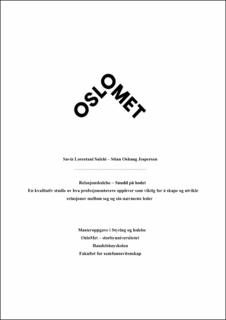Relasjonsledelse – Snudd på hodet En kvalitativ studie av hva profesjonsutøvere opplever som viktig for å skape og utvikle relasjoner mellom seg og sin nærmeste leder
Master thesis
Published version
Permanent lenke
https://hdl.handle.net/11250/3015414Utgivelsesdato
2022Metadata
Vis full innførselSamlinger
Sammendrag
This study looks at phenomena related to Leader-Member Exchange theory (LMX), from an employee perspective. Data in this study are taken from qualitative interviews with informants within professional education. The study has mapped the professionals’ reflections on their relationship with their immediate leader. The leader has the main responsibility of establishing and maintaining the relationship, but what role, and if so, how can the professional influence the relationship himself? For our part, we were curious to see if employees have an awareness related to this, and if so, how is this expressed and what consequences does this have for LMX?
There is already some research in this field. However, most of the available research in the context of LMX is based on the managerial perspective, not the employee perspective, as this study does - adding an additional challenge. Furthermore, we look at the employee's opinions, their own experiences, thoughts, and reflections related to management. The latter was not intentional, but in the process, after conducting the interviews, it became clear to us that we were sitting on useful information from our informants and were encouraged to illuminate and analyse further. The phenomenon we are talking about here concerns those of our informants, who describe having been exposed to unfortunate and poor management relationships, and what consequences we see that this has had on the individual. We have therefore made a choice in this study; we look both at the LMX theory and shed light on the informants’ descriptions of this phenomenon, as well as look at the phenomenon related to informants who have described negative leadership relationships.
